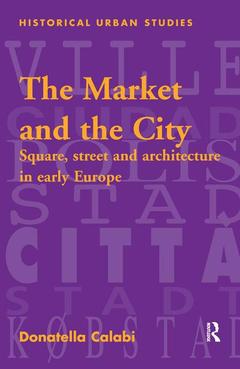Contents: List of illustrations, General editors' preface, Acknowledgements, Abbreviations, Introduction. Part I Market spaces and urban structure: Orbem in Urbe Vidimus...: Towards a topography of trade in the early modern city; Studying the configuration of space; The notion of portus: a permanent square; Order amidst mixed use; Thousands of variations: the transmission of models; Long-term reform; The 'longue durée' and architectural history. The 'Ease of Provisioning': Sites and images; The market insula; The bridge with shops; Physical discontinuity, chronological continuity. The Market in the City: At the beginning, on the outskirts: Venice; Paris; Nuremberg; Elsewhere, in the centre: Augsburg; Lübeck; Little by little, greater articulation: Venice, once again; Florence; Antwerp; Amsterdam; The diffused model: Seville; London; Diversity, fragmentation, form. Disorder and Mixed Use: The Concept of 'Boundary': Norms and increasing trade; Interference and interplay: stands, shops, houses; Ownership and conflicts of interest; The culture of the square and its image; Legal and physical boundaries. Part II Commercial Buildings: Use and Form: The Regularity of the Square: The square's geometry and the 'line' of shops: Venice: San Giacomo at Rialto; Florence: the Uffizi and the corridor; Genoa and Piazza Banchi; Seville and the problem of the 'plaza mayor'; Some buildings: Covered markets, halles, drapperie; La Halle aux Draps; The Fabbriche Vecchie; The Clothworkers' Hall; Bread, meat, fish, fruit and vegetables: Along the banks of the Grand Canal; In the centre of Florence; In the cities of Spain; In the city of London; Banks, business and the bourse: The Antwerp bourse; The Royal Exchange of London; The Amsterdam bourse; The Casa Lonja of Seville; The Loggia of Genoa; Fondaci: public warehouses and lodgings: The surplus granaries: The 'albergarie' of the Germans, Turks and Persians in Venice; The Hansa House in Antwerp; Index.





